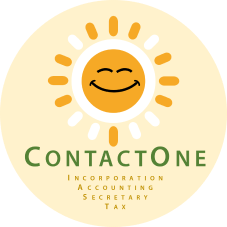Company Structure
A shareholder owns the company through the shares he holds whereas a director is in control of the day to day management of the business, and can exercise powers over the company, subject to the provisions of the Singapore Companies’ Act and the Constitution of the company.
A shareholder can choose to appoint himself as a director but a director need not be a shareholder of the company.
You need a minimum of 1 shareholder, who can either be an actual person or a corporate entity to form a company.
There is no requirement for the shareholder to be a local resident of Singapore. However, if you are a foreigner, you will need to engage the service of a professional firm like ContactOne to help you incorporate a company. You may wish to consider the incorporation services offered by ContactOne.
You will need at least one director who is a local resident of Singapore. In addition, a director must be a natural person and not a corporate entity.
Yes. A foreigner can be a director of a company in Singapore. However, you will still need to appoint a local resident as one of the directors of the company. You may wish to consider the nominee director service offered by professional firms like ContactOne. This method is suitable for you if you intend to run the business from overseas.
Should you wish to run the business in Singapore, you may wish to engage us to help you incorporate a company using our temporary nominee director service. We will subsequently assist you in the application for an Employment Pass for your position as a Managing Director of the company.
Yes. You must appoint a company secretary within 6 months from your company incorporation date. The company secretary must be a local resident and is a natural person. Singapore legislation disallows the use of a corporate entity to serve as a company secretary. You may wish to consider the company secretarial services offered by ContactOne
Issued capital refers to share capital allotted to the shareholders.
Paid up capital refers to share capital that is fully paid up by the shareholders
The minimum share capital requirement for a Singapore Company is $1. However, it is almost certain that for most companies, the business cannot start with just $1 start up money. Remember that Share Capital refers to the money you are GIVING to the Company to allow the company to start operations.
Generally, $1 companies do not convey much confidence if your potential customers/suppliers/business partners/landlord purchase your company profile and see that your share capital is $1. As a guide, share capital amount should be estimated as the sum of the expected expenditures the company needs to incur before it is self sustaining. So, if you plan on hiring 5 workers from day one, it is wise to ensure your capital amount is sufficient to pay their salaries for an X number of months.
For certain cases where your business involves tenders for government projects where projects you are allowed to bid for are limited by criteria which will likely include your share capital amount, a higher capital amount will be needed. Similarly, if your business requires certain licensing which involves having a minimum capital of $X, you will need to maintain that amount in order to get the license.
Broadly speaking, small scale businesses that do not require a physical shop front and are owner-operated typically do not have high capital amounts. These companies can operate just fine with a capital amount of between $500 to $5000. If the business involves purchasing assets before business can commence, a good capital amount will be the sum of these expenditure plus 3 – 6 months of operating expenses budgeted.
Finally, when the capital has been used up, in order to keep the business running, the shareholders may need to inject loans to the company to ensure that the company can continue to make its payments when due.
We get this question quite often from new entrepreneurs. We understand that it looks good when your customer sees your business profile with a $500K to $1M share capital. However, you must bear in mind that whatever amount you declare as share capital, represents monies that you are GIVING to the company. This means that the money no longer belongs to you legally.
By declaring a $1M capital, a shareholder is effectively declaring that he is now owing the Company $1M, until this $1M is fully funded in the company as paid up capital. This has the risky effect that if business did not turn out as planned, creditors have to right to force the shareholder to cough out the $1M because the creditors may argue that they enter into a business relationship with your company because it appears to be well funded via a high share capital. This will defeat the purpose of running a company because a company in essence should shield business risks from the personal assets of the shareholders.
It is a golden rule that whatever amount you declare as share capital, you should be able to adequately fund it.
The concept of par value and authorised capital has been removed from the Singapore Companies Act since 2006. As such, there is no requirement on authorised capital.
In order for you to start a business or incorporate a company in Singapore,
- You must be at least 18 years of age and
- You must not be an undischarged bankrupt or you must obtain the permission of High Court or the Official Assignee if you wish to form a business entity in Singapore.
You can refer to our section on Business Entities in Singapore for a clearer idea on the characteristics of the business vehicles for your business venture. Alternatively, you can contact us to seek further advice specific to your business needs.

